Welcome to the Advice Corner – your go-to space for practical tips, thoughtful guidance, and expert insights to help you navigate everyday challenges. Whether you’re looking for inspiration, solutions, or a fresh perspective, the Advice Corner is here to support your journey with reliable, easy-to-follow advice for a better, more balanced life.
Advice 1: How to Become a Great Cook: Essential Tips for Culinary Mastery
Advice 2: 10 Habits of Highly Successful Home Cooks
Advice 3: Kitchen Tools You Need
(and What to Skip)
Advice 4 : 5 Basic Cooking ways Every freshman Should Master to Come a Better Cook incontinently
Advice 5: How to Build Confidence in the Kitchen, One Dish at a Time
Advice 6: A Simple Guide to Understanding Spices and How to Use Them (Flavor Skills 101!)
From the Advice Corner #1: How to Become a Great Cook: Essential Tips for Culinary Mastery

Cooking isn’t just about following recipes, it’s about expressing creativity, understanding flavors, and mastering techniques that transform ingredients into memorable dishes. Whether you’re just starting out or looking to elevate your skills, these essential tips will guide you toward culinary success.
1. Master the Basics: Build a Strong Foundation
Before experimenting with complex recipes, take the time to understand fundamental techniques. Learn how to chop ingredients efficiently, sauté food to bring out its flavors, and bake with precision. Understanding cooking methods like roasting, steaming, frying, and braising gives you control over the outcome of your dish. The more confident you become with these basics, the more effortless your cooking will feel.
2. Choose Fresh, High-Quality Ingredients: Elevate Your Cooking
Great dishes start with exceptional ingredients. Fresh vegetables have vibrant flavors, high-quality proteins enhance texture, and the right herbs and spices elevate taste. Always aim for seasonal produce, it’s not only fresher but packed with nutrients. Remember, you don’t need expensive ingredients; sometimes, simplicity and freshness make all the difference.
3. Taste as You Cook: Develop Your Palate
The best cooks understand that tasting throughout the process is key. Don’t wait until the dish is finished, sample it at various stages, adjusting seasoning as necessary. Balancing sweetness, acidity, saltiness, and bitterness ensures a well-rounded dish. Pro tip: If a dish tastes flat, a splash of lemon juice or vinegar can instantly brighten flavors.
4. Learn from Mistakes: Embrace the Process
Every great chef has had cooking disasters, burnt dishes, bland flavors, or even complete kitchen failures. But mistakes are valuable lessons! Instead of getting frustrated, analyze what went wrong. Did you cook at too high a temperature? Forget to season? Overmix a batter? Each mistake is a stepping stone to improvement.
5. Experiment with Flavors: Find Your Signature Style
Be adventurous! Try different herbs, spices, and ingredients from various cuisines. Experimenting is how you discover exciting flavor combinations and develop your unique cooking style. Challenge yourself by trying international recipes, from Italian pasta to Moroccan tagines or Thai curries. The more diverse your experiences, the more versatile your cooking will become.
6. Stay Organized in the Kitchen: Cook Smarter, Not Harder
Organization makes cooking more enjoyable and efficient. Before starting, gather and prep all ingredients, this is called “mise en place,” a technique chefs use to streamline their process. A clean and clutter-free workspace helps you focus, reduces stress, and prevents last-minute scrambling. Plus, tidying as you go saves time after cooking!
7. Practice Regularly: Consistency Makes Perfect
Cooking is a skill that improves with experience. Try preparing different meals weekly, challenge yourself with new techniques, and refine dishes you love. Don’t hesitate to sample your dish as you prepare it. Regularly tasting your creation allows you to tweak seasonings and refine flavors on the fly. This real-time feedback ensures that you can perfect each dish, making thoughtful adjustments that cater to a variety of tastes and preferences.
Bonus Tip: Make Cooking Enjoyable
Cooking shouldn’t feel like a chore, it should be a fun and rewarding experience. Play your favorite music, involve friends or family, and take pride in the dishes you create. A positive and enthusiastic approach makes the kitchen a space for creativity rather than stress.
With patience, curiosity, and regular practice, you’ll become a confident and skilled cook in no time. Every dish is an opportunity to learn, experiment, and bring joy to those who taste your creations. Now, what’s the first recipe you’d love to master? 🍳🔥
by wafae
From the Advice Corner #2: 10 Habits of Highly Successful Home Cooks
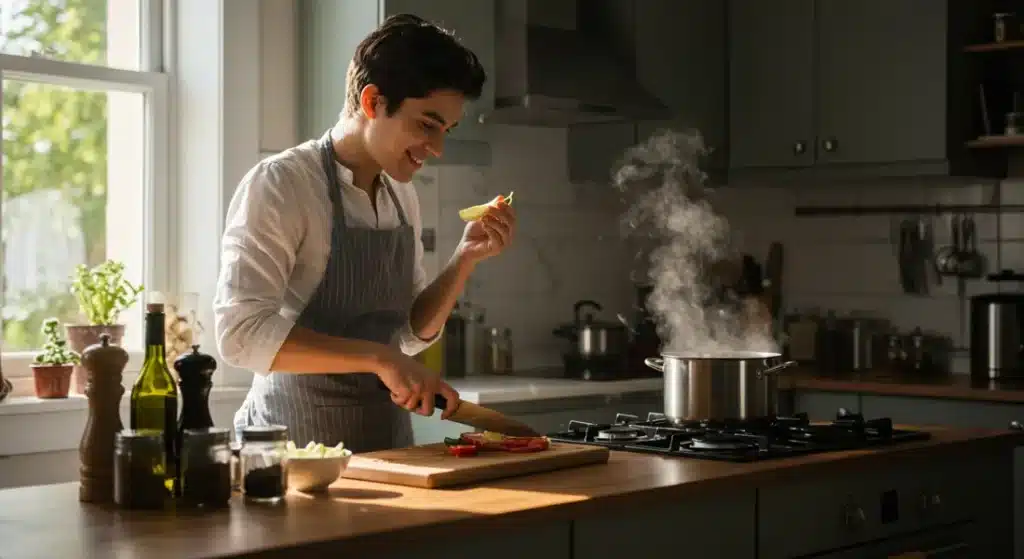
10 Habits of Highly Successful Home Cooks
Developing Routines and Mindsets for Culinary Mastery
Cooking is an art, a science, and a life skill that evolves with practice. Great home cooks don’t just follow recipes, they refine techniques, develop instincts, and approach cooking with curiosity and confidence. If you want to improve your cooking skills and cook with ease, adopting these habits will set you on a path to success in the kitchen.
1. Mise en Place: The Foundation of Efficiency
Before the heat is turned on, before the first ingredient is dropped into the pan, a successful home cook has already prepared. Mise en place (French for “everything in its place”) is a fundamental habit that professional chefs follow, and it dramatically improves the cooking process at home.
Why It Matters:
When your ingredients are prepped and organized beforehand, you eliminate unnecessary stress. You can focus on technique rather than scrambling for tools or measuring seasonings mid-cooking. This leads to better execution and a more enjoyable experience.
How to Implement:
-
Begin by reading the entire recipe before you start. This helps you understand the sequence and avoid surprises.
-
Gather all ingredients and prep them, chop vegetables, measure spices, and portion proteins.
-
Ensure that your cooking tools, knives, pans, spoons are within easy reach.
-
Keep a waste bowl nearby for discarded scraps to maintain a tidy workspace.
By mastering mise en place, you create a structured and stress-free environment that allows you to fully engage with the cooking process.
2. Taste As You Go: Develop a Chef’s Palate
Cooking isn’t just about following directions, it’s about making adjustments to enhance flavors. Successful home cooks understand that tasting throughout the process is critical to making a dish exceptional.
Why It Matters:
Food is dynamic; seasoning changes as ingredients cook, sugars caramelize, and acids mellow. Tasting at different stages allows you to balance flavors and make real-time improvements.
How to Train Your Palate:
-
Taste after every major step, when sautéing vegetables, before simmering sauces, and just before plating.
-
Learn to recognize the five core flavors: sweet, salty, sour, bitter, and umami. Adjust accordingly using ingredients like citrus, salt, honey, or soy sauce.
-
Compare how fresh herbs taste raw vs. cooked, or how the sweetness of onions transforms after caramelization.
-
Keep a flavor journal, write down what worked, what was missing, and ideas for future improvements.
With this habit, you evolve from simply following a recipe to truly understanding how ingredients interact.
3. Source and Appreciate Quality Ingredients
A great dish starts with great ingredients. No amount of technique can compensate for poor-quality produce or expired spices. Successful home cooks prioritize fresh, high-quality ingredients to enhance flavor and texture.
Why It Matters:
Just as an artist selects fine paints for a masterpiece, a cook selects prime ingredients for an exceptional dish. Fresh vegetables, well-marbled meats, and aromatic spices make a noticeable difference.
How to Choose Better Ingredients:
-
Shop seasonally produce in its peak season tastes better and costs less.
-
Smell and feel produce before buying; ripe fruits should have a fragrance, and vegetables should be firm and vibrant.
-
Invest in high-quality essentials like olive oil, butter, and vinegar, these elevate simple dishes.
-
Use fresh herbs instead of dried when possible for a brighter taste.
By sourcing the best possible ingredients, even simple meals will shine.
4. Master Basic Knife Skills
Successful home cooks understand the importance of using a sharp knife and practicing fundamental cutting techniques. Good knife skills improve efficiency, consistency, and safety in the kitchen.
Why It Matters:
Proper knife skills allow you to prepare ingredients faster and more precisely, ensuring even cooking. Learning a few essential cutting techniques will instantly elevate your kitchen confidence.
Knife Techniques to Learn:
-
The rocking chop: Used for mincing herbs or garlic.
-
Julienne: Cutting vegetables into matchstick-sized strips for stir-fries and garnishes.
-
Dice: Ensures even cooking and presentation in soups, stews, and sauces.
-
Chiffonade: Thin ribbon-like cuts for leafy greens and fresh herbs.
Practicing knife skills improves efficiency and gives your dishes a more professional look.
5. Understand Heat Control and Cooking Methods
Great home cooks don’t just cook, they control cooking. Understanding how different heat levels affect ingredients ensures better texture, color, and flavor.
Why It Matters:
Heat transforms ingredients, proteins coagulate, sugars caramelize, and moisture evaporates. By mastering heat control, you can prevent burning, overcooking, or bland results.
Heat Levels and Their Uses:
-
Low heat: Best for simmering soups, sauces, and melting butter.
-
Medium heat: Ideal for evenly cooking proteins or sautéing vegetables.
-
High heat: Best for searing meats, stir-frying, or getting crispy textures.
Learning when to adjust heat prevents unnecessary mistakes and makes cooking smoother.
6. Learn to Balance Flavors and Enhance Taste Instinctively
Cooking isn’t just about adding salt and pepper; it’s about understanding how flavors work together to create harmony. The best home cooks develop an intuitive sense of flavor balance, allowing them to adjust seasonings and ingredients dynamically.
Why It Matters:
Every great dish has a balance of flavors, sweetness, saltiness, acidity, bitterness, and umami. Learning how to refine that balance ensures that your food is never too bland, too salty, or too overpowering. It also allows you to adjust dishes to your personal taste and experiment more freely.
How to Master Flavor Balance:
-
Identify what’s missing. If a dish feels flat, think of what flavor you need, does it lack brightness (acid), depth (umami), or contrast (sweetness)?
-
Use counterbalancing flavors:
-
Too salty? Add acidity (lemon juice, vinegar) or sweetness (honey, sugar).
-
Too bland? Enhance umami with ingredients like soy sauce, miso, or mushrooms.
-
Too spicy? Cool it down with dairy (yogurt, cream) or something sweet.
-
-
Layer flavors gradually. Rather than dumping seasonings in all at once, build them up throughout the cooking process.
Home cooks who embrace this habit can tweak recipes on the fly and even create their own signature dishes with confidence.
7. Stay Curious and Continuously Learn
Cooking is a journey with endless possibilities. The best home cooks never stop learning; they explore new cuisines, refine techniques, and challenge themselves to improve.
Why It Matters:
Building a growth mindset in cooking helps you avoid stagnation and keeps the process exciting. Trying new methods and dishes broadens your palate, improves intuition, and deepens your understanding of food.
How to Cultivate Curiosity in Cooking:
-
Try global cuisines: choose a dish from a different country each month and learn the key spices and techniques behind it.
-
Study food science: understanding how ingredients interact (like why proteins brown or how acids tenderize meat) deepens your culinary intuition.
-
Follow chefs and food creators: watch cooking shows, read cookbooks, or explore recipe blogs for fresh inspiration.
-
Take notes on successes and failures: keep a cooking journal detailing what worked, what you’d change, and what you want to experiment with next.
Curiosity turns cooking into an adventure instead of a routine.
8. Cook Regularly and Make It a Daily Practice
Just like mastering an instrument or a sport, cooking skills improve with consistent practice. The most successful home cooks don’t just cook for special occasions, they make cooking a daily habit.
Why It Matters:
Cooking frequently builds efficiency, familiarity with ingredients, and confidence in improvising. Even simple meals contribute to skill development, allowing you to cook instinctively rather than relying on strict measurements.
How to Cook More Often:
-
Plan weekly meals: having a meal plan reduces stress and ensures you cook regularly.
-
Prepare big batches: make a base dish that can be repurposed into different meals throughout the week.
-
Cook simple dishes mindfully: even basic meals like scrambled eggs or soups can be an opportunity to practice technique.
-
Invite others to join you: cooking with family or friends makes the process more enjoyable and encourages consistency.
The more you cook, the more effortless it becomes.
9. Keep Your Kitchen Organized and Clean As You Cook
A cluttered kitchen leads to a chaotic cooking experience. Successful home cooks maintain an organized workspace, which helps them focus on technique rather than distractions.
Why It Matters:
Working in a clean and organized kitchen improves efficiency and reduces stress. It also helps prevent cross-contamination and makes post-cooking cleanup much easier.
How to Keep Your Kitchen Organized:
-
Clean as you go: wash dishes while waiting for water to boil or while ingredients are simmering.
-
Keep surfaces clear: return ingredients to their place after using them so counters remain uncluttered.
-
Organize tools smartly: store frequently used utensils near the stove and categorize pantry items for easy access.
-
Set a five-minute cleanup rule: before serving, take five minutes to tidy up small messes so cleanup afterward is effortless.
A well-organized kitchen makes cooking far more enjoyable.
10. Cook With Passion and Enjoy the Process
The best home cooks don’t just cook to eat—they cook because they love the process. They see every meal as an opportunity for creativity and expression.
Why It Matters:
Cooking should feel rewarding, not stressful. When you approach it with passion, it becomes an activity you look forward to rather than a chore. Successful home cooks find ways to make cooking enjoyable, whether through music, experimentation, or sharing meals with others.
How to Embrace the Joy of Cooking:
-
Cook with music or podcasts—setting a relaxing mood makes the process more enjoyable.
-
Experiment freely: don’t be afraid to tweak recipes, substitute ingredients, or add your personal touch.
-
Share meals: cooking for others brings a deep sense of connection and fulfillment.
-
Celebrate small improvements : each meal cooked is progress; enjoy the journey of learning.
Cooking is an art, a skill, and an expression of creativity, make it something you love!
Final Thoughts: Cooking as a Lifelong Skill
Developing these habits will transform your cooking experience, helping you move from following recipes to cooking instinctively. Since you love refining and experimenting with flavors, adopting these routines will deepen your culinary intuition and mastery.
by wafae
From the Advice Corner #3: Essential Kitchen Tools You Need (and What to Skip)
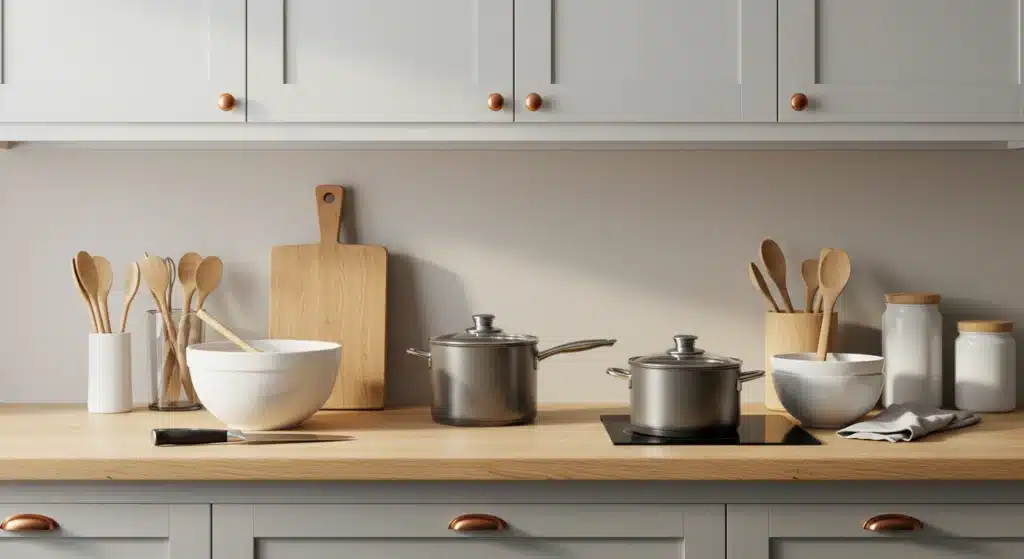
Set up your kitchen smartly with tools that truly matter.
Whether you’re moving into your first apartment, upgrading your kitchen, or just tired of cluttered drawers, figuring out what kitchen tools you really need can be overwhelming. Stores and websites are packed with shiny gadgets and trendy appliances, but let’s be honest, not all of them earn their place on your countertop.
In this guide, I’ll walk you through the must-have kitchen essentials, suggest a few nice-to-have upgrades, and help you avoid the overhyped tools that end up collecting dust. Let’s simplify your space and make cooking enjoyable again!
🛠️ Why Choosing the Right Tools Matters
A smart kitchen setup isn’t just about style, it’s about efficiency, space-saving, and reducing waste. The right tools make prep faster, cooking easier, and cleanup smoother. Whether you have a tiny kitchen or a spacious one, focusing on quality over quantity is key.
✅ Kitchen Tools You Actually Need
These essentials are the workhorses of any kitchen. If you’re starting from scratch, begin with these reliable basics:
1. Chef’s Knife
Invest in a good one. A sharp, comfortable chef’s knife will handle 90% of your slicing, chopping, and mincing tasks.
2. Cutting Board
Go for a sturdy, non-slip board. Wood or BPA-free plastic is ideal and easy to clean.
3. Measuring Cups & Spoons
Perfect for baking, but also handy for cooking precision matters!
4. Mixing Bowls (Set of 2–3 Sizes)
Use them for prepping ingredients, tossing salads, or mixing batters.
5. Silicone Spatula & Wooden Spoon
Great for stirring, scraping, and flipping without damaging your cookware.
6. Tongs
Once you own tongs, you’ll use them for everything turning meat, serving salads, flipping veggies.
7. Colander or Strainer
Essential for draining pasta, rinsing fruits, and washing rice.
8. Non-Stick or Cast Iron Skillet
Great for eggs, pancakes, sautéing vegetables, and more. Choose what fits your style.
9. Saucepan & Large Pot
Use the saucepan for sauces and grains; the big pot is your go-to for soups, stews, and pasta.
10. Baking Sheet
Even if you don’t bake cookies, it’s great for roasting veggies or toasting nuts.
🌟 Tools Worth Adding Later (Nice-to-Have)
These are helpful but not essential right away. Add them as your cooking evolves:
• Blender or Food Processor
For smoothies, dips, purees, or chopping in bulk.
• Digital Thermometer
No more guessing, this ensures perfectly cooked meat and baked goods.
• Microplane/Zester
Adds citrus zest, grates garlic or hard cheese effortlessly.
• Dutch Oven
It’s heavy, yes! but if you enjoy slow-cooked meals, you’ll love it.
🚫 Kitchen Gadgets to Skip (Seriously, Don’t Waste Your Money)
Some tools are fun to buy but rarely used. Here are a few to pass on:
✖ Avocado Slicer, Egg Separator, Banana Cutter
Your knife and a spoon can do all of these jobs just fine.
✖ Electric Can Opener
Takes up space and isn’t better than a compact manual one.
✖ Too Many Knives
All you really need: a chef’s knife, a paring knife, and maybe a serrated one.
✖ Mandoline Slicer
Unless you’re a pro or love paper-thin veggies, it’ll sit in a drawer (plus they’re risky if you’re not careful).
🛒 Smart Shopping Tips
-
Choose tools that do more than one job.
-
Read reviews before buying prioritize durability and ease of cleaning.
-
Skip big sets unless you know you’ll use every piece.
-
Don’t be afraid to buy high-quality second-hand items.
👩🍳 Final Thoughts: Build a Kitchen That Works for You
When it comes to stocking your kitchen, less is more. Stick with reliable tools you’ll use regularly and build up from there based on your cooking habits. Your kitchen should be a place you love spending time in, not one that overwhelms you.
So, start simple, invest in quality, and enjoy every meal you create.
From the Advice Corner #4 : 5 Basic Cooking ways Every freshman Should Master to Come a Better Cook incontinently
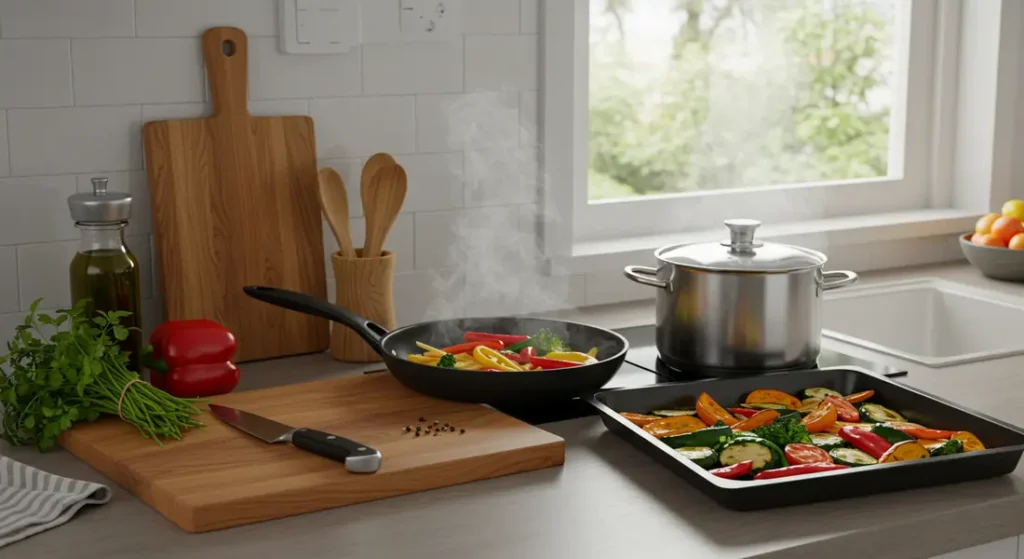
Do you want to become a better chef without taking professional classes? Mastering a few fundamental cooking techniques is the key. Whether you’re preparing meals for your family or experimenting with new recipes, these essential skills can elevate your dishes from average to amazing.
Here are five foundational techniques that will instantly boost your confidence in the kitchen.
1. Sautéing – The Secret to Quick, Flavorful Meals
Sautéing is a fast cooking method that uses high heat and a small amount of oil to brown food and develop rich flavors. It’s an essential skill for making stir-fries, sautéed vegetables, and perfectly seared proteins.
Pro Tips
-
Use a wide, shallow pan for better heat distribution.
-
Preheat your pan before adding oil.
-
Avoid overcrowding the pan, each piece needs space to cook properly.
-
Stir or flip regularly for even browning.
This method is ideal for preparing healthy meals without sacrificing taste or texture.
2. Roasting – Enhance Flavor with Dry Heat
Roasting is a simple and effective way to bring out the natural sweetness in vegetables and achieve perfectly crisp textures in meats. It involves cooking food in the oven using dry heat, often at high temperatures.
Pro Tips
-
Cut ingredients into uniform sizes for even cooking.
-
Use olive oil and seasonings to enhance flavor.
-
Space out food on the baking sheet to prevent steaming.
-
Roast at 400°F (200°C) or higher for golden, crisp results.
Try roasting seasonal vegetables or a whole chicken for an impressive yet simple meal.
3. Boiling – A Fundamental Kitchen Technique
Boiling is one of the most straightforward cooking methods, yet it’s often underestimated. It’s essential for cooking pasta, rice, eggs, and vegetables properly.
Pro Tips
-
Always bring water to a full boil before adding ingredients.
-
Add salt to enhance flavor, especially when cooking pasta.
-
Use a large pot with plenty of water.
-
Reduce the heat to a simmer after boiling to prevent overcooking.
Mastering boiling is a great step toward becoming a more confident cook.
4. Simmering – Slow Cooking for Deeper Flavor
Simmering involves gently cooking food in liquid at a temperature just below boiling. This technique is ideal for making soups, stews, sauces, and braised dishes.
Pro Tips
-
Maintain a steady, gentle simmer, avoid a rolling boil.
-
Stir occasionally to prevent sticking.
-
Use a lid to retain moisture and intensify flavors.
-
Allow longer cooking times to develop rich, complex tastes.
Want to create the perfect homemade soup? Simmering is your best friend.
5. Knife Skills – The Foundation of Safe and Efficient Cooking
Before any cooking begins, proper knife skills will make your prep faster and safer. Learning how to handle and use a knife correctly is one of the most valuable skills in the kitchen.
Pro Tips
-
Use a sharp chef’s knife to reduce the risk of accidents.
-
Practice basic cuts: chopping, dicing, slicing, and mincing.
-
Use the claw grip to protect your fingers.
-
Keep your cutting board stable and clean.
Good knife techniques also help ingredients cook more evenly, a key to creating great meals.
Cook with Confidence
You don’t need expensive tools or fancy recipes to prepare delicious meals at home. By mastering these five essential cooking techniques, sautéing, roasting, boiling, simmering, and knife skills you’ll build a solid foundation in the kitchen and instantly become a better chef.
Bonus Tip: Keep Practicing and Stay Curious
Cooking is a skill that improves with practice. Don’t be afraid to experiment, make mistakes, and try new methods. Over time, your instincts and confidence will grow.
Recommended Reads
👉 [How to Become a Great Cook: Essential Tips for Culinary Mastery]
👉 [Healthy Meal Prep Recipes for Beginners]
From the Advice Corner #5: How to Build Confidence in the Kitchen, One Dish at a Time
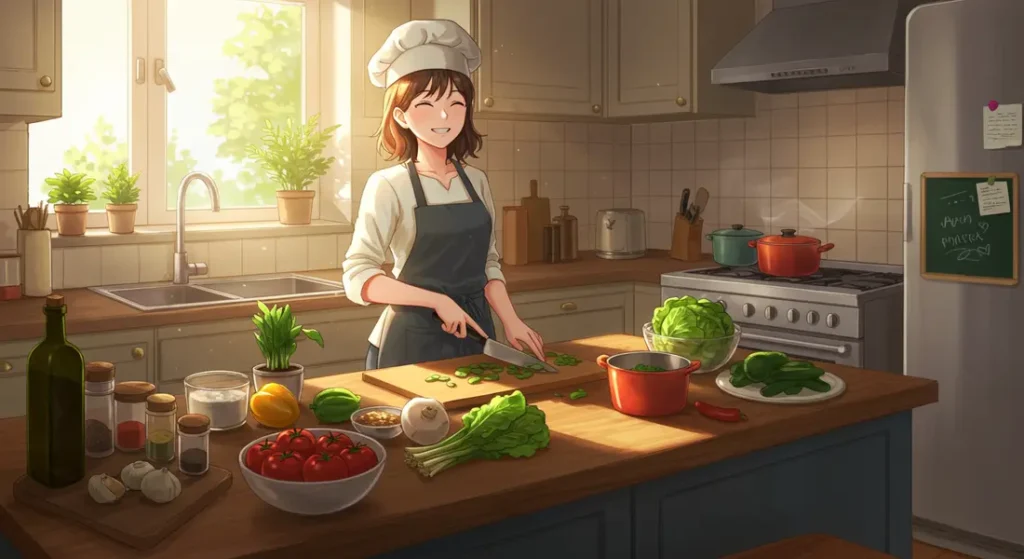
Cooking isn’t just about feeding your body, it’s a journey of discovery, creativity, and personal growth. When you step into the kitchen, you step into a realm where every ingredient, every spice, and every technique offers an opportunity to build confidence and learn something new. This article is designed to motivate and encourage you to embrace your culinary journey, one dish at a time.
Start with the Basics
Every master chef began as a beginner. The first step in building confidence in the kitchen is to start small. Choose simple recipes that you feel comfortable with and focus on mastering fundamental skills such as chopping, sautéing, and boiling. By perfecting these basics, you create a solid foundation that paves the way for tackling more complex dishes down the line. Remember, each small success is a building block in boosting your culinary self-esteem.
Tips for Getting Started:
-
Pick a Simple Recipe: Start with dishes that have only a few ingredients and clear instructions.
-
Gather Essential Tools: Equip your kitchen with a few basic utensils and appliances that make cooking easier.
-
Practice Regularly: Set aside time, even if it’s just one meal per week, to cook and experiment.
-
Celebrate Every Win: Whether your dish is picture-perfect or just tasty enough, celebrate your progress.
Embrace Experimentation and Learning
One of the most exciting parts of cooking is discovering your own style. As you grow more comfortable with basic recipes, begin to experiment with variations. Try swapping one ingredient for another, adjusting flavors, or adding your personal touch to traditional recipes. This experimentation not only makes the process fun but also teaches you how different elements interact in a dish.
Every experiment, whether it leads to a delicious masterpiece or a flavorful learning experience, is a step toward building your culinary confidence. View each trial as an opportunity to understand your palate better and to refine your cooking techniques. Trust yourself and let your creativity soar.
Overcoming Mistakes: A Recipe for Growth
The kitchen is a classroom, and every mistake is a valuable lesson. Perhaps you’ve overcooked your pasta, or maybe a sauce didn’t thicken as expected. Instead of feeling discouraged, treat these moments as vital learning experiences. Analyze what went wrong, adjust your approach, and try again. This positive mindset transforms failures into successes, gradually building both your skills and your self-esteem in the kitchen.
Strategies for Learning from Mistakes:
-
Keep a Culinary Journal: Write down what worked and what didn’t, along with any adjustments you made.
-
Reflect on Each Cooking Experience: After every meal, think about one thing you learned and one thing you’d like to improve.
-
Seek Feedback: If you’re cooking for friends or family, ask for their honest opinions, it’s a great way to grow and refine your approach.
Cultivate a Positive Kitchen Environment
Your mindset plays a crucial role in how you perform in the kitchen. Create an atmosphere that is both inspiring and conducive to learning. Whether it’s playing your favorite upbeat music, setting the table beautifully, or simply keeping your workspace tidy, small details can significantly boost your confidence. A positive and organized cooking space not only helps you focus but also turns cooking into a delightful experience rather than a chore.
Celebrate Your Culinary Milestones
Building confidence in the kitchen is a journey marked by little victories, each cooked dish is proof of your progress. Take time to acknowledge and celebrate these achievements. Share your creations with loved ones, document your culinary journey on social media, or even start a food blog. These tangible milestones reinforce your growing skills and serve as a powerful reminder that your efforts are paying off.
Let Your Passion Lead the Way
Ultimately, the most important ingredient in building kitchen confidence is passion. When you cook with love and enthusiasm, it transforms the entire experience. Allow your curiosity to guide you explore new flavors, delve into cuisines from different cultures, and don’t be afraid to push your boundaries. The more passionately you engage with cooking, the more natural it becomes, turning challenges into opportunities for further growth.
Final Thoughts
Building confidence in the kitchen is not about achieving perfection overnight, it’s about embracing every step of the process. One dish at a time, you’re not only honing your culinary skills but also building a reservoir of confidence that extends well beyond the kitchen. Remember: every chop, every stir, and every taste brings you closer to becoming the confident cook you aspire to be.
As you continue your culinary adventure, consider trying out a new cooking technique, exploring a food blog for inspiration, or even taking a cooking class. What will your next dish be? Happy cooking!
From the Advice Corner #6: A Simple Guide to Understanding Spices and How to Use Them (Flavor Skills 101!)
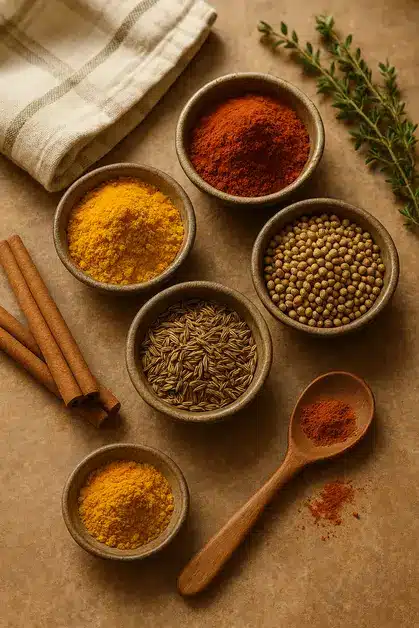
By Wafa Chef | wafarecipes.com
When it comes to home cooking, spices are the secret ingredients that transform a good dish into a great one. They add depth, aroma, heat, and personality, turning even the simplest ingredients into something unforgettable.
Whether you’re a beginner in the kitchen or a seasoned home cook, learning how to use spices properly is one of the most valuable (and fun!) culinary skills you can develop. This simple guide will introduce you to the flavorful world of spices and show you how to use them with confidence.
🌿 What Are Spices, Really?
Spices are dried parts of plants such as seeds, bark, roots, and fruits used to flavor, color, or preserve food. They differ from herbs, which typically come from the leafy parts of plants. Common examples of spices include cinnamon (bark), cumin (seeds), and turmeric (root).
Spices have been prized throughout history not only for their flavor but also for their medicinal and preservative qualities. And now, they’re your ticket to bold, delicious meals from any cuisine around the world.
🧂 Why Learning to Use Spices Is a Game-Changer
Using spices correctly is like speaking the language of flavor. Once you understand which spices work well together and how to use them, you unlock endless creativity in the kitchen.
Benefits of mastering spice use:
-
Create complex, restaurant-quality meals at home
-
Add depth without relying on heavy sauces or salt
-
Explore global cuisines with ease
-
Boost health with natural, antioxidant-rich ingredients
🔥 The Must-Know Spice Basics
Here’s a breakdown of some popular spices and tips for using them effectively:
1. Cumin
-
Flavor: Earthy, warm, nutty
-
Best in: Mexican, Indian, Middle Eastern dishes
-
Tip: Toast cumin seeds before grinding for more intense flavor
2. Turmeric
-
Flavor: Bitter, earthy, slightly peppery
-
Best in: Curries, soups, rice, smoothies
-
Tip: Pair with black pepper to enhance its health benefits
3. Paprika
-
Flavor: Sweet or smoky depending on the type
-
Best in: Stews, marinades, rubs
-
Tip: Add at the end of cooking to preserve color and flavor
4. Cinnamon
-
Flavor: Sweet, woody, warm
-
Best in: Desserts, oatmeal, Moroccan tagines
-
Tip: Use in savory dishes like chili or roasted vegetables for a twist
5. Coriander
-
Flavor: Citrus-like, sweet
-
Best in: Indian, Thai, and Latin dishes
-
Tip: Use seeds and ground form differently—seeds for toasting, ground for seasoning
🧑🍳 How to Use Spices Like a Pro
✅ Start with Small Amounts
Too much spice can overpower a dish. Begin with ¼ to ½ teaspoon and taste as you go.
✅ Bloom Your Spices
Cooking spices in a little oil or butter before adding liquids (like broth or tomatoes) helps release their full flavor. This technique is known as blooming.
✅ Use Whole When You Can
Whole spices (like cardamom pods or cinnamon sticks) retain their potency longer and offer better flavor than pre-ground ones.
✅ Store Them Right
Keep your spices in airtight containers, away from light and heat. Freshness matters, a good rule is to replace ground spices every 6–12 months.
🌍 Global Spice Blends to Try
If you’re just starting, premade spice blends can be your best friend. Here are some favorites:
-
Garam Masala (India): Warm, aromatic
-
Za’atar (Middle East): Herby, tangy, nutty
-
Ras el Hanout (North Africa): Floral, complex
-
Cajun Seasoning (Southern USA): Spicy, smoky
-
Chinese Five Spice: Sweet, savory, and deeply aromatic
Use them to season meats, vegetables, soups, or even roasted nuts!
🍛 Easy Flavor Pairings
Try these spice pairings for everyday meals:
-
Chicken: Paprika + garlic + thyme
-
Beef: Black pepper + cumin + smoked paprika
-
Fish: Dill + lemon zest + coriander
-
Vegetables: Turmeric + cumin + chili powder
-
Rice: Cardamom + bay leaf + cinnamon stick
🥄 Final Thoughts: Flavor Is Fun!
Spices are not just ingredients, they’re tools for expression. Think of them as your kitchen’s color palette, ready to paint flavors across your dishes.
Start with what you have, experiment with combinations, and most of all have fun with it! The more you play with spices, the more confident and creative you’ll become.
💡 Bonus Tip: Keep a Flavor Journal
Track which spices you use, what you like (or don’t), and ideas for next time. This will accelerate your growth and help you develop your signature flavor style.
